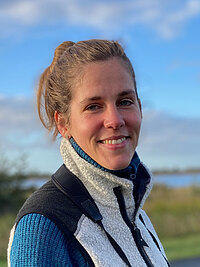Dr. Lara Schmittmann

OFFICE
Room No.: 3.310, Building 5 (ENB)
Phone: +49 431 600 4177
E-mail: lschmittmann(at)geomar.de
ADDRESS
GEOMAR Helmholtz Centre for Ocean Research
Wischhofstr. 1 - 3
24148 Kiel
Germany
WORK EXPERIENCE AND EDUCATION
04/2022-present Postdoctoral Researcher at GEOMAR Helmholtz Centre for Ocean Research, Kiel, Ozeandynamik (Advisor: Prof. Arne Biastoch)
01/2022-06/2022 Postdoctoral Researcher at GEOMAR Helmholtz Centre for Ocean Research, Kiel, Deep-Sea Biology (Advisor: Dr. Henk-Jan Hoving)
2017-2022 PhD candidate at GEOMAR Helmholtz Centre for Ocean Research, Kiel, within the International Max-Planck Research School for Evolutionary Biology (Advisors: Prof. Ute Hentschel, Dr. Lucía Pita)
2014-2017 M.Sc. Biological Oceanography, Christian-Albrechts-Universität Kiel (Advisors: PD Frank Melzner, Prof. Thorsten Reusch)
2011-2014 B.Sc. Biology, Westfählische Wilhelms-Universität Münster (Advisors: Prof. Joachim Kurtz, Dr. Momir Futo)
PUBLICATIONS
Accepted: Hoy P., Hassenrück C., Mittermayer-Schmittmann F., Schmittmann L., Jürgens K. Changes in microbiome of the sponge Halichondria panicea at different salinities in the Baltic Sea. Frontiers in Microbiology.
Kingsly B. C., Akimova A., Laakmann S., Sidorenko V., Rubinetti S., Pineda-Metz S.E.A., Pogoda B., Brand S.C., Klemm K., Wegner K.M., Shama L.N.S., Schmittmann L., Gimenez L., Alter K., Stechele B., Rahdarian A., Winter C., Androsov A., Sokolova I., Sell A.F. 2025 Integrating Molecular Methods and Biophysical Modeling to Assess Functional Connectivity between Marine Protected Areas. Ecological Applications. https://doi.org/10.1002/eap.70150
Steiner L.X., Schmittmann, L., Rahn T., Lachnit T., Jahn M.T., Hentschel U. 2024 Phage-induced disturbance of a marine sponge microbiome. Environmental Microbiome. https://doi.org/10.1186/s40793-024-00637-7
Schmittmann L.*, Schindler S.V.*, Bayer T., Fuss J., Havermans C., Merten V., Hoving H.J.T. 2024 The sinking dead – Arctic deep-sea scavengers' diet suggests nekton as vector in benthopelagic coupling. Environmental DNA. https://doi.org/10.1002/edn3.70020 *contributed equally
Schmittmann L., Busch K., Mock. L-C., Rath W. Kluger L.C. 2024 Beyond the Bay: Biophysical simulations of disease dispersal suggest broadening spatial scales for aquaculture carrying capacity. One Earth. 7:1202-1212. https://doi.org/10.1016/j.oneear.2024.05.023
Von Hoyningen-Huene A.J.E., Bang C., Rausch P., Rühlemann M.C., Fokt H., He J., Jensen N., Knop M., Petersen C., Schmittmann L., …, and Schmitz-Streit R.A. 2024 The archaeome in metaorganism-research with a focus on marine models and their bacteria-archaea interactions. Frontiers in Microbiology. 15:1347422. org/10.3389/fmicb.2024.1347422
Stenvers I.V., Hauss H., Bayer T., Havermans C., Hentschel U., Schmittmann L., Sweetman A.K., Hoving H.J.T. 2023 Experimental mining plumes and ocean warming trigger stress in a deep pelagic jellyfish. Nature Communications. 14:7352. https://doi.org/10.1038/s41467-023-43023-6
Carrier TJ., Schmittmann L., Jung S., Pita L., Hentschel U. 2022 Maternal provisioning of an obligate sponge symbiont. Ecology and Evolution. 13:e10012. https://doi.org/10.1002/ece3.10012
Schmittmann L., Rahn T., Busch K., Fraune S., Pita L., Hentschel U. 2022 Stability of a dominant sponge-symbiont in spite of antibiotic-induced microbiome disturbance. Environmental Microbiology. 24:6392–6410. http://doi.org/10.1111/1462-2920.16249
Podbielski I., Schmittmann L., Sanders T., Melzner F. 2022. Towards a mechanistic understanding of low salinity acclimation ability in marine invertebrates – a systematic review and meta-analysis. Frontiers in Marine Science. 9:934378. http://doi.org/10.3389/fmars.2022.934378
Carrier TJ., Maldonado M., Schmittmann L., Pita L., Bosch TCG., Hentschel U. 2022. Symbiont transmission in marine sponges: reproduction, development and metamorphosis. BMC Biology. 20:100. http://doi.org/10.1186/s12915-022-01291-6
Schmittmann L. 2022. Establishing the breadcrumb sponge Halichondria panicea as an experimental model for sponge symbioses. Dissertation. macau.uni-kiel.de/receive/macau_mods_00002685
Schmittmann L., Franzenburg S., Pita L. 2021. Individuality in the immune repertoire and the induced response of the sponge Halichondria panicea. Frontiers in Immunology. 12:689051. http://doi.org/10.3389/fimmu.2021.689051
Schmittmann L., Jahn M. T., Pita L., Hentschel U. Decoding cellular dialogues between sponges, bacteria and phages in “Cellular dialogues in the holobiont (Bosch & Hadfield eds.)”. 2020. CRC Press. http://doi.org/10.1201/9780429277375-4
Sanders, T., Schmittmann, L., Nascimento-Schulze, J. C., Melzner, F. 2018. High calcification costs limit mussel growth at low salinity. Frontiers in Marine Sciences. 5:352, 1-9. http://doi.org/10.3389/fmars.2018.00352
CONFERENCES
2023 Native Oyster Restoration Allicance Meeting, Middelburg, Netherlands: Quantifying the risk of disease dispersal to European flat oyster restoration sites by ocean modelling (talk)
2022 Sponge Conference, Leiden, Netherlands: Stability of a dominant sponge-symbiont during antibiotic-induced microbiome disturbance (talk)
2022 Ocean Health Symposium, Kiel, Germany: Modelling dispersal of marine diseases (poster)
2021 Annual Conference of the Society for Experimental Biology, online: How low can you go? Capacity for salinity tolerance in marine osmoconformers under hypo-osmotic stress. (talk, presented by I. Podbielski)
2021 Aquatic Sciences Meeting, ASLO, online: Temporal abundance dynamics of sponge-associated bacteria after microbiome manipulation and recolonization (talk)
2020 Annual retreat of the IMPRS for Evolutionary Biology, online: On establishing the breadcrumb sponge Halichondria panciea as an experimental model for sponge symbioses. (talk)
2019 Gordon Research Seminar for animal-microbe symbioses and Gordon Research Conference for animal-microbe symbioses, Vermont, USA: The sponge model on the runway of symbiosis: aposymbiotic sponges offer great potential for in vivo experimentation (poster)
2019 Young investigator day 2019, Kiel, Germany: Aposymbiotic sponges offer great potential for understanding host-bacteria interactions (poster)
2019 Organizer and presenter at the annual retreat of the IMPRS for Evolutionary Biology, Oeversee, Germany: Aposymbiotic sponges offer great potential for understanding host-bacteria interactions (poster)
2018 Marine Evolution, Strömstad, Sweden: Understanding evolutionarily ancient mechanisms of sponge-microbe interactions (poster)
2018 Annual retreat of the IMPRS for Evolutionary Biology, Breklum, Germany: Establishing a gnotobiotic sponge culture (poster)
2017 Annual Conference of the Society for Experimental Biology, Gothenburg, Sweden: Adaptation of the common sea star Asterias rubens to different salinities (poster)
SCIENCE COMMUNCATION
October 2023 "Wissenschaft fürs Wohnzimmer"
September 2023 "Highlights der Physik"
Certificate program "Science Communication" at CAU Kiel
August 2022 Newspaper article Süddeutsche Zeitung "Wie viel taucht die Meeresbiologin?"
TEACHING EXPERIENCE
2025 Supervision Master Thesis Géo Bujard, Sorbonne University, France
2024/2025 Lecture for course "Current Topics in Marine Ecology"
2019 Course “Animal-Microbe Symbioses” within the Master Program Biological Oceanography, GEOMAR (3 weeks)
Erasmus internship Violeta Albacete, UCM Madrid (3 months, with Lucía Pita)
Internship Ashley Coons, CAU Kiel (4 weeks)
2018/2019 Bachelor Thesis Julius Krebs, JMU Würzburg
2018 Course “Animal Physiology” within the Master Program Biological Oceanography, GEOMAR (3 weeks)
2017 Course “Molecular Ecology” within the Master Program Biological Oceanography, GEOMAR (3 weeks)


